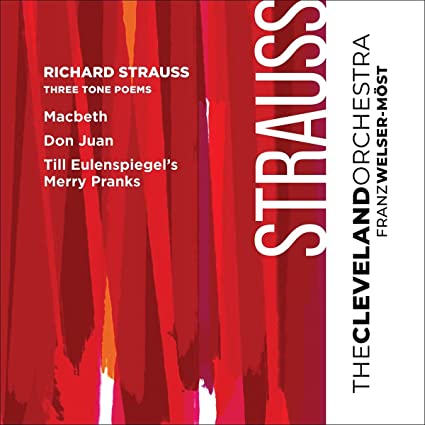
ESSENTIAL RECORDINGS

Macbeth, Op. 23 Don Juan, Op. 20 Till Eulenspiegel's Merry Pranks, Op. 28
The Cleveland Orchestra launched their own in-house recording label in March of 2020. Compared to most other major orchestras, they were late to the party, but have more than made up for that so far by releasing highly impressive 'live' recordings. And let me start by saying that this one, the fourth release since the label's inception, is a thrilling sonic experience from start to finish. I can't think of a better way to flex your sonic muscle and display your orchestral brilliance than by performing these marvels of orchestration, the tone poems by Richard Strauss (1864-1949).
Mind you these are early works composed between 1886 and 1895 when Strauss was still a young man, but they already manifest all of the indicators pointing to the mature composer of the magnificent Alpine Symphony, Op. 64 written more than 20 years later. Especially Don Juan, Op. 20, in which Strauss exhibits a firm grasp on motivic and thematic development, all combined with a bold, new harmonic design. I guess one could say that Richard Strauss compares well to Gustav Mahler, but whereas Mahler reigned supreme over the long form symphonic structure, Strauss was the master of the short, single-movement tone poem. The audacious character of Don Juan springs to life within the music, and conductor Franz Welser-Möst, who has been the Cleveland Orchestra's music director for 20 years now, brings out all of its bold and passionate impertinence as well as its amatory charms. The bold and uplifting horn statements at the 8:32 mark are superb here, and right to the end, Franz Welser-Möst holds together the multitude of conflicting turmoils the character of Don Juan must endure until his tragic demise.
I must also point out the detailed and extensive booklet notes that shed light and insights into the impetus and motivation behind the creation of these works, from the characters they are based on to the musical inspiration that invoked them. From literature excerpts to musical notation examples, its all-inclusive and a pleasure to read.
Hopefully, plans are already in the works for future 'live' recordings of some of Richard Strauss' big guns, like Also Sprach Zarathustra and An Alpine Symphony, because if the present recording is any indication, we would be in for a treat.
Jean-Yves Duperron - June 2022